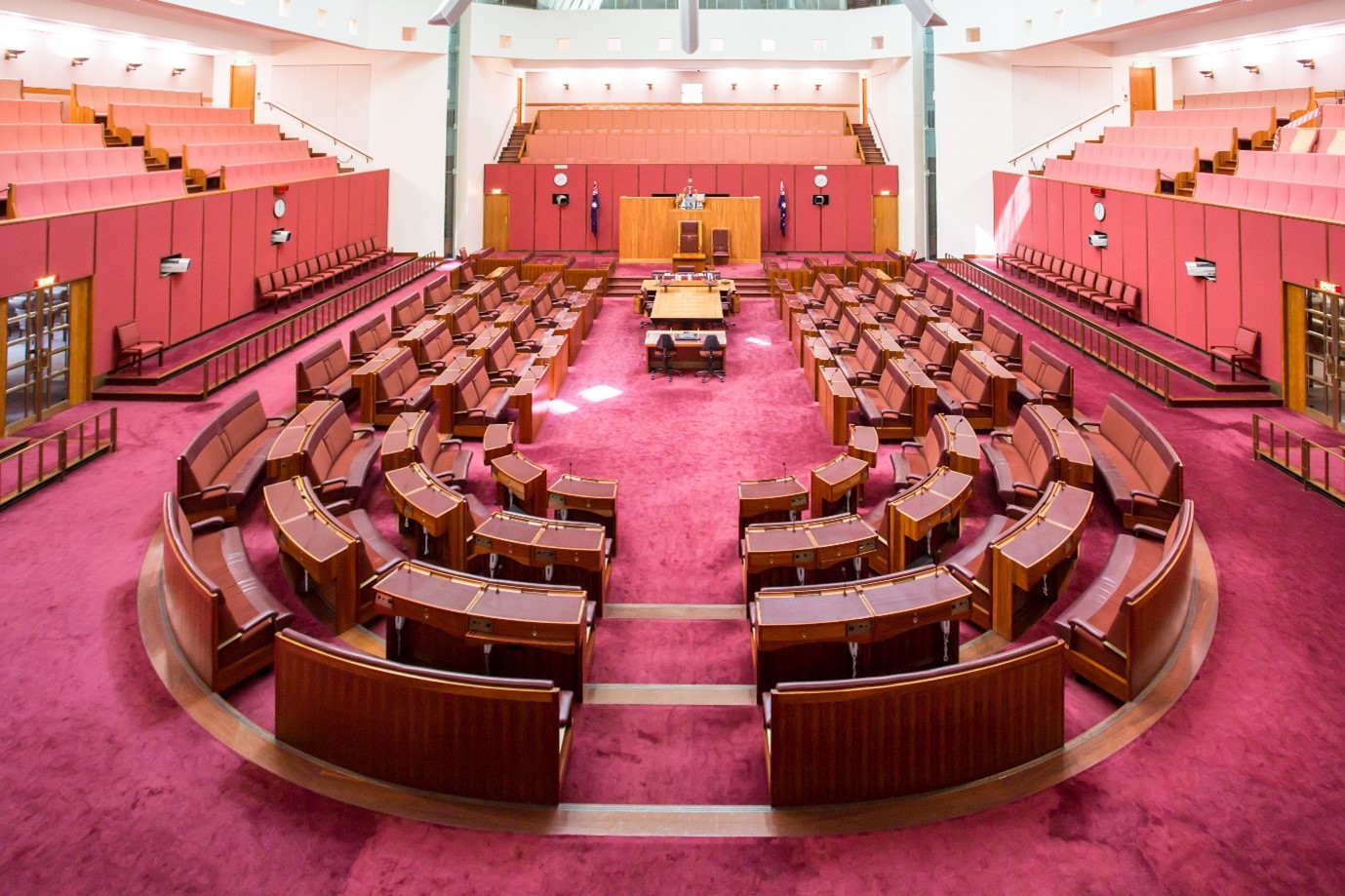No matter if the next federal election is in 2021 or 2022, the Senate will face significant changes that could impact the way the future government operates.
The next half-senate election must be conducted before 30th June 2022, and the race for re-election will have decisive consequences on the passage of policy and legislation for whoever wins a majority in the House of Representatives.
As the Senator’s service expiry dates loom, Australians need to understand the Senate’s power and how the senators we elect to the Upper House change how Federal Parliament functions.
WHAT DOES THE SENATE DO?
The Senate works in combination with the House of Representatives to pass bills and create Australian laws.
The Senate is considered the ‘house of review’ and is designed to be a robust check and balance on the current government’s power.
The proportional representative voting system used to elect senators for each state and territory enables more independent and small party candidates to be elected to the Upper House. This means that it is harder for the party in power to gain a majority of votes in the Senate and enables non-government senators to have the combined capacity to reject or amend government legislation.
In recent times, only one party in government-held a majority in the Senate, with former Prime Minister John Howard holding a majority in the Senate during his fourth term between 2004 – 2007.
This means that crossbench senators hold significant influence over both the government and opposition in the Senate, as the Liberal and Labor parties must make concessions or compromises to gain majority support.
In recent years, independent senators like Senator Rex Patrick have provided both parties with support to pass or amend legislation through the Upper House. This power also extends to Senate Committees, where most recently, Senator Pauline Hanson and her party traded their support for the establishment of a review into the Family Court system.
Many of the current Senate Crossbench ending their terms at the next election will face an uphill re-election battle. Minor party senators not up for re-election until 2025, such as Senator Malcolm Roberts and Senator Jacqui Lambie, could increase their political clout in the new Senate.
This will further increase the Greens and One Nation’s value to whoever is in power, with their bloc of votes likely to become vital to the passage of legislation in the Senate on contested issues.
ROLE OF THE SENATE DURING COVID-19 PANDEMIC:
The Senate has played a significant role in reviewing the government’s response to the pandemic and assessing the reactionary legislation proposed to boost the economy, limit the spread of the virus and provide vaccines to the Australian public.
The Senate established the Select Committee on COVID-19 on 8th April 2020. The inquiry into the Australian Government’s response to the COVID-19 pandemic is overseen by 7 Senators from the Crossbench, Opposition, and Coalition. The committee will report to the Senate on its findings by 30th June 2022.
Partly due to the pandemic itself, Parliament reduced the number of sitting days during 2020. In turn, this reduced the opportunity for Parliament members to closely examine the work the government is doing throughout the COVID-19 crisis.
Senator Katy Gallagher (who heads the committee) claimed that this contributed to the establishment of the inquiry as the Senate believed “the committee would provide the appropriate scrutiny that’s needed not just over the next few months but, indeed, over the next 18 months or so.”
HOW SENATORS GET ELECTED:
To get elected or re-elected into the Senate, a candidate must gain approximately 1/7th of each state’s total number of votes. This percentage is called a quota.
A quota is established by dividing the total number of electors in a territory or state by the number of senators that are elected and adding one.
To make sure each state of Australia has an equal voice in the Senate, every state has the same number of senators.
Historically, there has been much contention around this decision as some believe it gives voters in smaller states or territories a more powerful influence in the Senate than other larger states.
For example, at the 2013 half-Senate election, the number of votes required to elect a Tasmanian senator was approximately 48,000, while the number of the votes needed to elect an NSW senator was approximately 625,000.
Like other elections, when a Senate election occurs, voters receive a ballot paper on which they can vote above the line by party only or vote below the line for individual candidates.
When someone votes above the line, the parties themselves decide which of their candidates are allocated votes. Once the first candidate on their ticket has achieved a single quota, the excess vote is then transferred to the next candidate on the party ticket.
Senators who do not receive a full quota are then eliminated, starting with the candidate with the least votes. When a candidate is eliminated, their votes are then moved to other candidates based on individual voter preferences.
Therefore, senators that do not achieve a quota in their own right may still be elected if there is a large enough preference flow towards them from other party candidates.
The service terms and election rules for senators in the Australian territories – Northern Territory and the Australian Capital Territory – differ from the states’ rules.
While states are represented by six senators each, the territories are only represented by two senators. This means that an NT or ACT senator needs significantly more votes to be elected to Parliament than senators standing for election in the states. To be elected to the Senate for the Territories, senators need approximately 33% of the first party vote to achieve a quota.
While state senators generally face re-election every six years, NT and ACT Senators face re-election approximately every three years – simultaneously as the House of Representatives elections.
SENATORS UP FOR RE-ELECTION:
| NSW:
· Senator the Hon Marise Payne (Liberal Party) · Senator Jim Molan AO DSC (Liberal Party) · Senator the Hon Concetta Fierravanti-Wells (Liberal Party) · Senator the Hon Kristina Keneally (Labor Party) · Senator Jenny McAllister (Labor Party) · Senator Deborah O’Neill (Labor Party) |
TAS:
· Senator the Hon Eric Abetz (Liberal Party) · Senator Wendy Askew (Liberal Party) · Senator the Hon Jonathon Duniam (Liberal Party) · Senator Helen Polley (Labor Party) · Senator Anne Urquhart (Labor Party) · Senator Peter Whish-Wilson (Australian Greens)
|
| QLD:
· Senator the Hon James McGrath (Liberal National Party Queensland) · Senator the Hon Amanda Stoker (Liberal National Party Queensland) · Senator the Hon Matthew Canavan (Nationals) · Senator Murray Watt (Labor Party) · Senator Anthony Chisholm (Labor Party) · Senator Pauline Hanson (Pauline Hanson’s One Nation) |
VIC:
· Senator the Hon Scott Ryan (Liberal Party) · Senator Sarah Henderson (Liberal Party) · Senator the Hon Bridget McKenzie (Nationals) · Senator Kimberley Kitching (Labor Party) · Senator the Hon Kim Carr (Labor Party) · Senator Linda Thorpe (Australian Greens) |
| SA:
· Senator the Hon Simon Birmingham (Liberal Party) · Senator Andrew McLachlan CSC (Liberal Party) · Senator the Hon Don Farrell (Labor Party) · Senator the Hon Penny Wong (Labor Party) · Senator Stirling Griff (Centre Alliance) · Senator Rex Patrick (Independent)
|
WA:
· Senator the Hon Michaelia Cash (Liberal Party) · Senator Ben Small (Liberal Party) · Senator Dean Smith (Liberal Party) · Senator Glen Sterle (Labor Party) · Senator Sue Lines (Labor Party) · Senator Rachel Siewert (Australian Greens) *
|
*Senator has announced retirement at the next election
If the House of Representatives’ federal election is called in 2021, the territory senators will also be up for re-election.
| ACT:
· Senator Katy Gallagher (Labor Party) · Senator the Hon Zed Seselja (Liberal Party)
|
NT:
· Senator Sam McMahon (Country Liberal Party) · Senator Malarndirri McCarthy (Labor Party) |
Latest posts by Nexus APAC (see all)
- United Kingdom General Election 2024: An Overview - April 15, 2024
- Australian Voters Go to the Polls - February 26, 2024
- Secretaries of Federal Departments – An Overview - February 1, 2024



